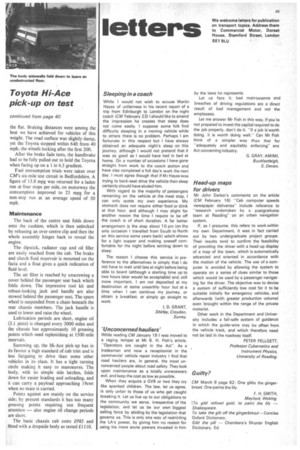etters
Page 47

If you've noticed an error in this article please click here to report it so we can fix it.
Sleeping in a coach
While I would not wish to accuse Martin Hayes of unfairness in his recent report of a trip from Edinburgh to London on the night coach (CM February 23) I should like to amend the impression he creates that sleep does not come easily. I suppose some folk find difficulty sleeping in a moving vehicle while to others there is no problem. Perhaps I am fortunate in this respect but I have always obtained an adequate night's sleep on this journey, although I would not pretend that it was as good as I would have had in bed at home. On a number of occasions I have gone straight from work to the coach station and have also completed a full day's work the next day. I must agree though that if Mr Hayes was trying to back-seat drive the vehicle then sleep certainly should have eluded him.
With regard to the majority of passengers remaining on the vehicle at the meal stop. I can only quote my own experience. My stomach does not require either food or drink at that hour, and although I may alight for another reason the time I require to be off the coach is of short duration. A far better arrangement is the stop about 10 pm (on the only occasion I travelled from South to North on this service some years back) which allows for a light supper and making oneself comfortable for the night before settling down to sleep.
The reason I choose this service in preference to the alternatives is simply that I do not have to wait until late at night before being able to board (although a starting time up to two hours later would be acceptable) and, still more important, I am not deposited at my destination at some unearthly hour but at a time when I can continue my journey, or obtain a breakfast, or simply go straight to work.
I. D. GRANT, Shirley, Croydon, Surrey,
'Unconcerned hauliers'
While reading CM January 19 I was moved to a raging temper at Mr B. H. Fish's article, "Operators are caught in the Act". As a tradesman and now a receptionist in the commercial vehicle repair industry I find that road hauliers are, in general, the most unconcerned people about road safety. They look upon maintenance as a totally unnecessary evil, and keep the cost as low as possible.
When they acquire a GV9 or two they cry like spanked children. The law, let us agree, is only unfair to those of us who get caught breaking it. Let us live up to our obligations to the community we serve, irrespective of the legislation, and let us be our own biggest selling force by abiding by the legislation that governs us. This is only one way of restricting the LA's power, by giving him no reason for using his more acute powers invested in him by the laws he represents.
Let us face it, bad maintenance and breaches of driving regulations are a direct result of bad management and not the employees.
Let me answer Mr Fish in this way. If you're not prepared to invest the capital required to do the job properly, don't do it. "If a job is worth doing, it is worth doing well." Can Mr Fish think of a simpler way than that for "adequately and equitably enforcing" any Act concerning industry.
G. GRAY, AMIMI, Buckfastleigh, S. Devon.
Head-up maps for drivers
Mr John Darker's comments on the article (CM February 16) "Cab computer speeds newspaper deliveries" include reference to "research undertaken by a postgraduate team at Reading" on an urban navigation system.
If, as I presume. this refers to work within my own Department, it was in fact carried out by two undergraduate project groups. Their results tend to confirm the feasibility of providing the driver with a head-up display of a map of the town, which is automatically advanced and oriented in accordance with the motion of the vehicle. The use of a computer is avoided by allowing the system to operate on a series of clues similar to those which would be used by a passenger navigating for the driver. The objective was to devise a system of sufficiently low cost for it to be suitable initially for emergency vehicles, and afterwards (with greater production volume) even 'brought within the range of the private motorist.
Other work in the Department and University includes a fail-safe system of guidance in which the guide-wire may be offset from the vehicle track, and which therefore need not be laid in the roadway itself.
PETER FELLGETT, Professor Cybernetics and Instrument Physics. University of Reading,
Guilty?
CM March 9 page 62: One gilds the gingerbread. One paints the lily.
F. H. SMITH, Mayford, Woking. (To gild refined gold, to paint the lily — Shakespeare.
To take the gilt off the gingerbread—Concise Oxford Dictionary.
Gild the pill Chambers's Shorter English Dictionary. Ed.
























































































































